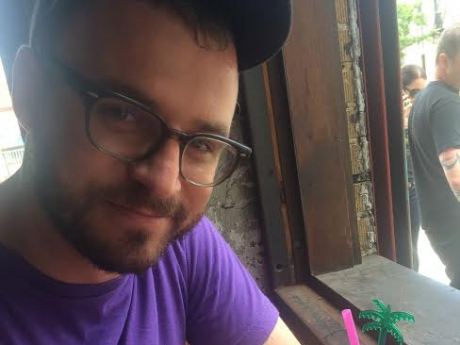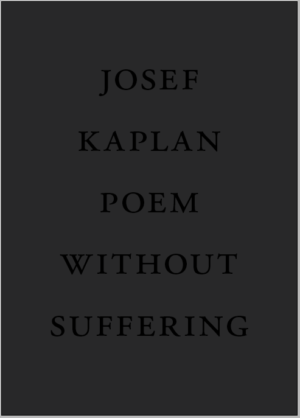In Their Own Words
Josef Kaplan on “Poem Without Suffering”

"Poem Without Suffering" (an excerpt)
To have it happen,
but to have it not
be considered
tragedy, at least not
in the traditional
sense, the way in
which one senses
form in drama
as human suffering.
It's not that.
It's not that
because suffering
is irrelevant
to the act itself.
That is, it creates
no suffering, at least
not in the moment
that it happens,
and at least not
for the children.
They don't suffer.
Not unless we
imagine suffering
to exist beyond our
ability to perceive it,
as with the fear that
we might, after our
expiration, appear
dead in every way
to friends, family,
and medical
professionals, when
we are in fact not dead,
but living, in a sense,
conscious underneath
that appearance, left
with all senses intact,
but simultaneously
lacking the will and
motor control necessary
to express their
presence—to move
a hand, or open
our mouth and
exclaim or signal
our distress at having
been washed and shaved,
our eyes closed, our jaw
sewn into some
natural-seeming shape,
slightly cocked
like an incision,
one made just below
our belly button,
a cut just wide
enough to
accommodate
an instrument
inserted to drain
us of our fluids
and replace them
with formaldehyde,
phenol, glutaraldehyde,
methanol, ethanol,
and water, arresting us
with this solution, as if
it were an argument,
an answer to the problem
of what to do with
an empty body,
or any emptiness at all,
like a grave is empty
and so calls to be filled,
and calls our body down
into it, in silence.
From Poem Without Suffering (Wonder Books, 2015). All rights reserved. Reprinted courtesy of the author.
On "Poem Without Suffering"
This is from the opening few pages of Poem Without Suffering, and it has I guess one somewhat mysterious element: "To have it happen / but to have it not / be considered tragedy" - this "it," which is unexplained at first, but which not too much later clearly comes to reference the shooting death of a child.
Alongside that, we get the start of these digressions (here, some anxieties around the sensory experience of death, as well as a description of the embalming process) that spin off in various ways from the narrative of the shooting and constitute, in general, the driving, formal logic of the piece.
Which is all a bit obvious.
That sounds coy, but I think it's also pretty much true. In part because I think the book is so explicitly self-explanatory. It's a book built out of explanations. It's constantly clarifying what, exactly, it's representing, which is how it's able to stretch out this one abrupt moment of violence: because every minute element constituting that act can be elucidated in more and more expansive, more detailed ways. Hence, the digressions.
So, it's tricky to write this kind of companion piece. The book already does much of the work for me. Its challenges are of a different order, one not entirely suited to footnoting - there aren't many obscure allusions, or very abstract, esoteric symbols which I could otherwise just parse. Instead, the book's difficulty lies in making sense of the associations generated through this chain of mostly straightforward expositions.
That's my read, anyway.
I've always been a fan of secretly strange things. I like it when art reveal its strangeness in unassuming ways - like when writing presents itself as a fairly routine exercise in genre, but then, through clever and/or bizarre manipulations of that genre's conventions, produces effects that are unexpected and compelling.
The straightforwardness of much of Poem Without Suffering tries to pay homage to that. The poem doesn't really overtly belong to any one genre, but it's similar to the idea of genre in this one broad sense: it tries to locate complexity, not within an immediately obtuse, alienating eccentricity, but instead within the relentless accumulation of the familiar, until what, exactly, might determine the familiar begins to blur.



